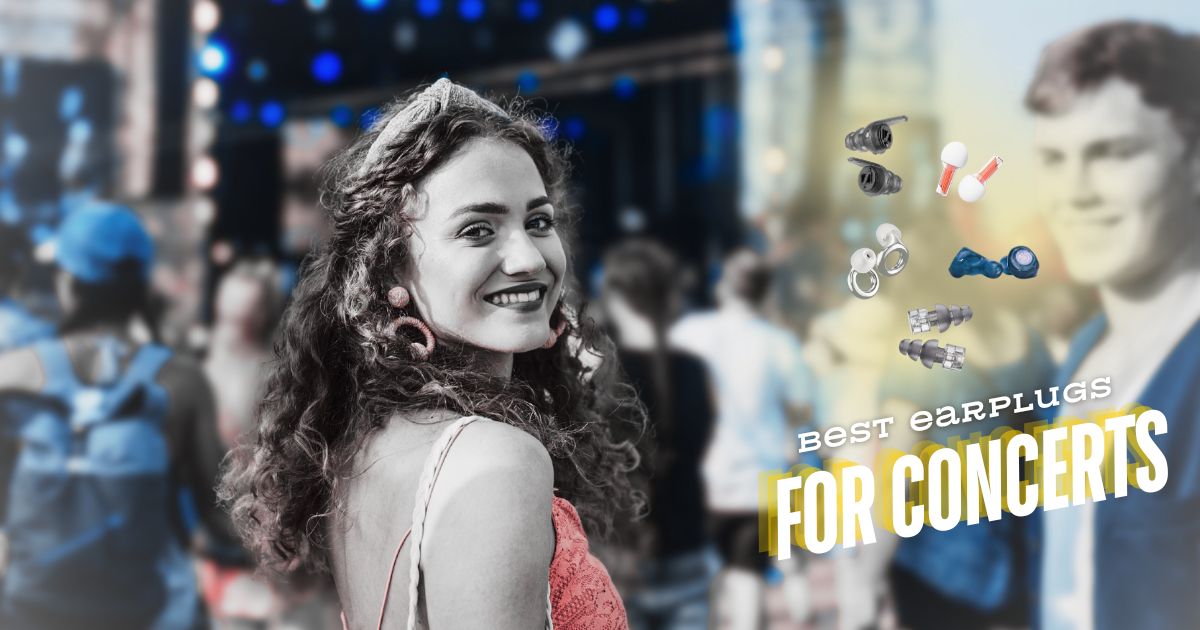Concerts are the ultimate ear candy, where the beats drop, the bass thumps, and the music makes your heart sing. The thrill of a live show—the energy of the crowd and the pulse of the music from your favorite artists—can leave you buzzing with excitement long after the final encore. But while that immersive wall of sound is exhilarating, it can also take a toll on your hearing, potentially causing lasting damage.
Prolonged exposure to loud music, especially at concerts where sound levels often reach 100 to 120 dB, can lead to permanent hearing loss. Studies have shown that even music at levels lower than what’s considered safe for an 8-hour workday (known as TWA8, or Time-Weighted Average over 8 hours, which is 85 dB) can negatively affect hearing over time. For example, a safe daily exposure is about 85 dB over 8 hours, but at a concert, sound levels are much higher, and the exposure time can be many hours. This can lead to temporary hearing loss, tinnitus (ringing in the ears), and eventually, permanent damage to the tiny hair cells in your inner ear that are critical for hearing.
These temporary effects, like muffled hearing or ringing in the ears, might seem harmless and usually subside after a few hours or days. However, repeated exposure to loud music can cause permanent damage, as the hair cells don’t recover from repeated stress.
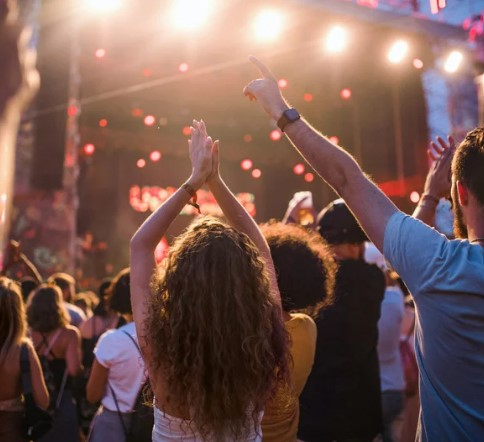 This can lead to long-term hearing issues such as difficulty hearing certain frequencies or persistent tinnitus.
This can lead to long-term hearing issues such as difficulty hearing certain frequencies or persistent tinnitus.
Fortunately, you don’t have to miss out on the fun. High-fidelity earplugs, also known as musician earplugs, allow you to enjoy the full concert experience while lowering the volume to protect your hearing. These earplugs reduce the decibels to safe levels without distorting the sound, letting you fully immerse yourself in the music.
- What are musician’s earplugs?
- Standard earplugs vs. filtered earplugs
- What to look for in earplugs
- Comparing popular earplug brands
- Custom filtered earplugs – pros vs. cons
High Fidelity, Musician Earplugs – What are They?
Protecting your ears at concerts is crucial, but many people are reluctant to use earplugs due to a lack of awareness about their effectiveness and limited availability.
Standard hearing protectors, commonly used in industrial environments, often distort music by excessively reducing higher-pitched sounds. This distortion can negatively impact the listening experience, making traditional earplugs less appealing for concertgoers.
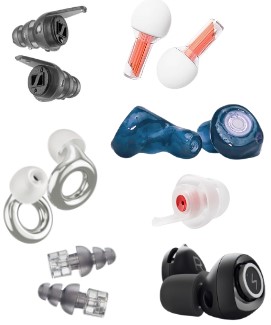 To solve this problem, musician earplugs were developed to provide a more balanced reduction in volume across all frequencies, preserving the natural sound while lowering the volume to safe levels.
To solve this problem, musician earplugs were developed to provide a more balanced reduction in volume across all frequencies, preserving the natural sound while lowering the volume to safe levels.
Initially custom-made for professional musicians, these earplugs are now available in pre-molded versions, making them accessible to anyone who loves live music. Musician earplugs typically offer less reduction in volume compared to industrial earplugs, which can be advantageous in leisure settings where overly reducing sound might hinder communication and discourage regular use.
However, the effectiveness of earplugs isn’t just about their design; proper fit and consistent use are crucial. The ability to correctly fit earplugs depends on various factors, including the user’s dexterity, ear canal shape, and the earplug’s design. Comfort and ease of use are also important, as these factors influence whether people will consistently use earplugs at concerts.
Research shows that musician earplugs, particularly custom-made versions, are highly appreciated by professional musicians and serious music enthusiasts for their sound quality. However, for casual concertgoers, factors like comfort and aesthetics might be just as important as sound quality.
Studies by Ergun, Cakmak, & Alniacik, (2024) suggest that, despite some minor comfort and communication issues, musician earplugs are generally well-received by both music students and non-music students, highlighting their potential as a practical solution for hearing protection in loud environments.
Regular vs. Filtered Earplugs: What’s the Difference?
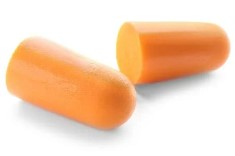 Regular Earplugs are typically made from foam or silicone and are designed to block out as much sound as possible. While they effectively reduce noise levels, they tend to muffle sound, making music and conversations unclear.
Regular Earplugs are typically made from foam or silicone and are designed to block out as much sound as possible. While they effectively reduce noise levels, they tend to muffle sound, making music and conversations unclear.
They’re generally inexpensive and widely available, making them a common choice for general noise protection.
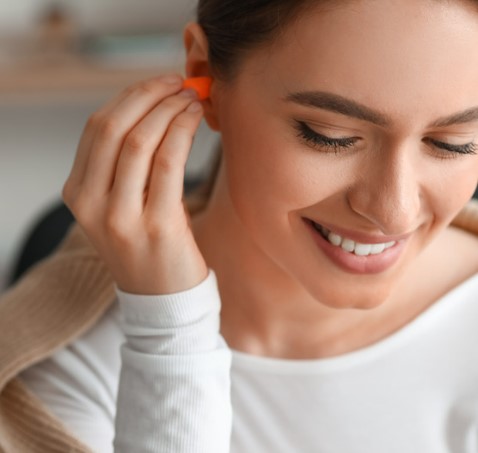 High-fidelity or musician earplugs are a specialized type of filtered earplug that use advanced filters to reduce sound levels evenly across all frequencies. This design preserves the clarity and quality of sound while lowering the overall volume, allowing you to enjoy the full spectrum of music without distortion. Although more expensive than regular earplugs, their ability to maintain natural sound quality makes them a valuable investment for frequent concertgoers, musicians, or anyone in environments where sound fidelity is important.
High-fidelity or musician earplugs are a specialized type of filtered earplug that use advanced filters to reduce sound levels evenly across all frequencies. This design preserves the clarity and quality of sound while lowering the overall volume, allowing you to enjoy the full spectrum of music without distortion. Although more expensive than regular earplugs, their ability to maintain natural sound quality makes them a valuable investment for frequent concertgoers, musicians, or anyone in environments where sound fidelity is important.
A randomized controlled trial by Ramakers et al., (2016) found that participants wearing earplugs had significantly lower rates of temporary hearing loss and tinnitus compared to those without ear protection. The study also showed a greater decrease in DPOAE amplitudes (a measure of ear function) in the unprotected group.
This adds evidence that earplugs are effective in preventing temporary hearing loss during exposure to high recreational music levels, underscoring the importance of using ear protection to avoid noise-induced hearing loss (Beach, Nielsen, & Gilliver, 2016).
What to Look for in Earplugs
When choosing earplugs for concerts, it’s important to consider more than just protection. Here are some key factors:
- Comfort and Fit: If earplugs are uncomfortable, you’re unlikely to wear them, so make sure they fit well and are comfortable for long periods.
- The Noise Reduction Rating (NRR): a standardized measure used to quantify the effectiveness of hearing protection devices, such as earplugs or earmuffs, in reducing noise exposure in decibels (dB). The NRR indicates the level of noise reduction provided by the hearing protection when worn correctly.
- Lifespan: Consider whether you want a one-time-use product or something reusable. Foam earplugs are cheap and easy to find but generally only last for 1-2 uses and aren’t great for music. Reusable earplugs offer better sound quality and are more durable.
- Sound Distortion: Music-focused earplugs should reduce noise without distorting sound. Typical music earplugs reduce noise by 13-18 dB, which is sufficient for most concert environments. If you need higher protection, such as for construction work or hunting, look for earplugs with NRR ratings in the 20s or above.
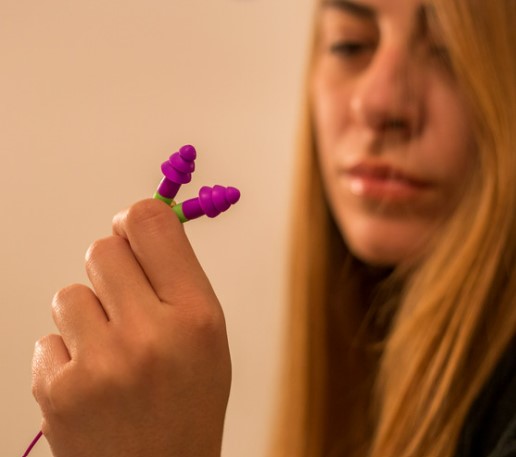 When choosing earplugs for concerts, it’s essential to balance protection with comfort, fit, noise reduction, lifespan, and sound quality to ensure an enjoyable and safe experience.
When choosing earplugs for concerts, it’s essential to balance protection with comfort, fit, noise reduction, lifespan, and sound quality to ensure an enjoyable and safe experience.
Comparing Popular Earplug Brands:
1. Etymotic Earplugs
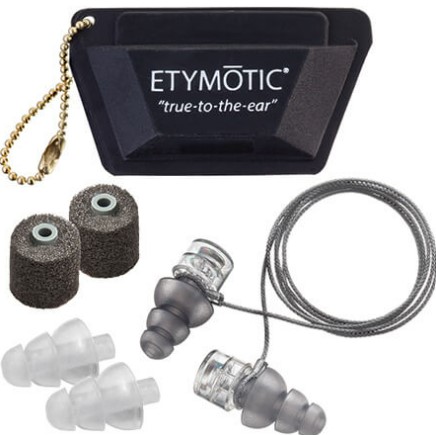 Etymotic is a pioneer in the high-fidelity earplug market, known for its “flat frequency response” design that has stood the test of time, especially among audiophiles. Their earplugs offer a noise reduction rating (NRR) of 13 dB, providing excellent sound quality without distortion. The ER20XS model comes in standard, large, or universal sizes and includes a carrying case for convenience.
Etymotic is a pioneer in the high-fidelity earplug market, known for its “flat frequency response” design that has stood the test of time, especially among audiophiles. Their earplugs offer a noise reduction rating (NRR) of 13 dB, providing excellent sound quality without distortion. The ER20XS model comes in standard, large, or universal sizes and includes a carrying case for convenience.
Key Features:
- NRR: 13 dB
- Design: Audiophile-friendly filters for clear, natural sound
- Accessories: Includes carry case and neck cord
- Usage: Ideal for concerts, airshows, athletic events, and motorsports
Drawbacks:
- Limited Noise Reduction: The NRR of 13 dB may not be sufficient for extremely loud environments.
- Fit Variability: Some users might find the standard or large sizes less comfortable, especially for extended wear.
- Less Versatile: Compared to newer models, Etymotic earplugs might not offer as many customization options or interchangeable filters.
The Etymotic earplugs typically retail between $19.99 to $24.99.
2. Earpeace Ear Plugs
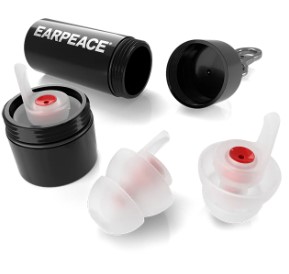 Earpeace earplugs are praised for their comfort and versatility, offering interchangeable filters that provide different levels of noise reduction (17 dB, 20 dB, and 26 dB). Made from soft silicone, they are comfortable for long periods of use and come in a sleek metal carrying case, making them ideal for concerts and festivals.
Earpeace earplugs are praised for their comfort and versatility, offering interchangeable filters that provide different levels of noise reduction (17 dB, 20 dB, and 26 dB). Made from soft silicone, they are comfortable for long periods of use and come in a sleek metal carrying case, making them ideal for concerts and festivals.
Key Features:
- NRR: 17 dB, 20 dB, and 26 dB options
- Design: Interchangeable filters for customizable noise reduction
- Accessories: Includes a metal carrying case
- Usage: Suitable for various environments, from concerts to motor sports
Drawbacks:
- Fit Issues: The multi-flange design might not be as comfortable for everyone, and the traditional look might not appeal to those seeking a more discreet option.
- Cleaning Complexity: Separate filters can be tricky to clean without damaging them, and the pull tab design may not be to everyone’s liking.
Earpeace earplugs are priced between $20 and $40.
3. Eargasm Earplugs
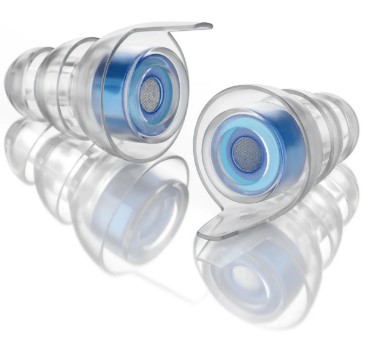 Eargasm earplugs are a popular choice among music enthusiasts, offering high-fidelity filters that preserve sound clarity while reducing noise by up to 21 dB. They come with two sizes of ear tips to ensure a good fit for different ear sizes and include a durable aluminum case for on-the-go protection.
Eargasm earplugs are a popular choice among music enthusiasts, offering high-fidelity filters that preserve sound clarity while reducing noise by up to 21 dB. They come with two sizes of ear tips to ensure a good fit for different ear sizes and include a durable aluminum case for on-the-go protection.
Key Features:
- NRR: Up to 21 dB
- Design: High-fidelity filters for clear sound with noise reduction
- Accessories: Includes two sizes of ear tips and an aluminum case
- Usage: Ideal for concerts, festivals, and other loud environments
Drawbacks:
- Limited Noise Reduction: While 21 dB NRR is sufficient for most music venues, it might not be enough for extremely loud environments.
- Sound Quality: While generally good, some users report slight muffling of sound, especially at higher frequencies.
- Price Point: Eargasm earplugs can be more expensive than basic models, which might deter some users.
Eargasm products range from $20 to $50.
4. Sennheiser SoundProtex Line
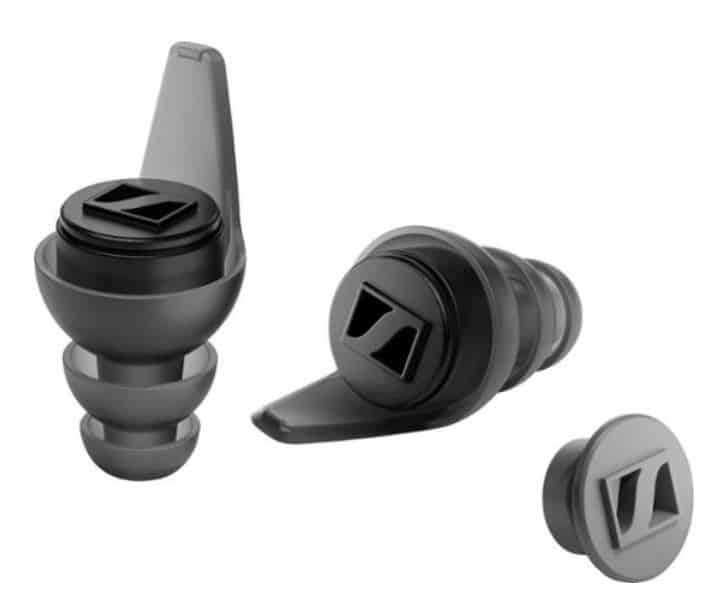 Sennheiser’s SoundProtex line is designed for music lovers, offering advanced filter technology that reduces noise levels by up to 19 dB without compromising sound quality. These earplugs are made from hypoallergenic materials and come in various sizes for a secure and comfortable fit.
Sennheiser’s SoundProtex line is designed for music lovers, offering advanced filter technology that reduces noise levels by up to 19 dB without compromising sound quality. These earplugs are made from hypoallergenic materials and come in various sizes for a secure and comfortable fit.
Key Features:
- NRR: Up to 19 dB
- Design: Advanced filters for clear sound and noise reduction
- Accessories: Available in regular and Plus versions with different filter options
- Soft, highly pliable material is ranked highly for comfort for extended wear time
- Usage: Perfect for concerts, festivals, and other music-related events
Drawbacks:
- Price: The Protex line is more expensive than many of the non-custom musician high fidelity earplugs.
- Full-Block Filter Limitations: The full-block filter doesn’t completely eliminate noise, which may not meet the expectations of those seeking near-total silence.
The Sennheiser SoundProtex range retails between $40 to $80.
5. Vibes Earplugs
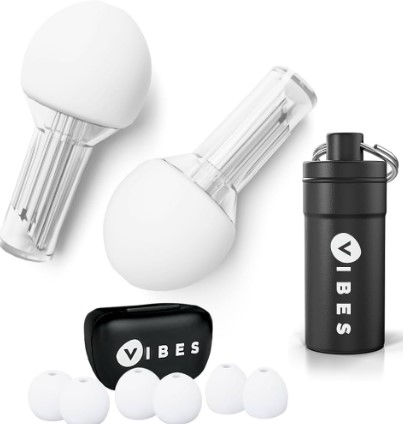 Vibes earplugs are known for their subtle, stylish design and suitability for loud music environments. They offer up to 22 dB of noise reduction and are comfortable enough for long sessions. The low-profile design and clear plastic housing make them almost invisible when worn.
Vibes earplugs are known for their subtle, stylish design and suitability for loud music environments. They offer up to 22 dB of noise reduction and are comfortable enough for long sessions. The low-profile design and clear plastic housing make them almost invisible when worn.
Key Features:
- NRR: Up to 22 dB
- Design: Low-profile and clear housing for discreet use
- Accessories: Comes with a carrying case and multiple ear tip sizes
- Usage: Ideal for concerts, band practices, and other loud events
Drawbacks:
- Sound Quality: Some users report that the earplugs slightly muffle sound, particularly at higher frequencies.
- Limited Noise Reduction: The 22 dB NRR might not be sufficient for very loud environments.
- Durability: While generally well-made, some users have reported issues with the longevity of the earplugs, particularly with the silicone tips.
The Vibes earplugs retail between USD 25 to 30.
6. Minuendo Live Earplugs
 Minuendo Live earplugs are a premium option, offering a unique adjustable sound attenuation with a stepless slider, allowing users to change the NRR from 7 to 25 dB. These earplugs come with multiple ear tip sizes and styles, providing a customizable fit.
Minuendo Live earplugs are a premium option, offering a unique adjustable sound attenuation with a stepless slider, allowing users to change the NRR from 7 to 25 dB. These earplugs come with multiple ear tip sizes and styles, providing a customizable fit.
Key Features:
- NRR: Adjustable from 7 to 25 dB
- Design: Stepless sound attenuation with a sliding lever
- Accessories: Includes multiple ear tip sizes and a durable case with a neck loop
- Usage: Suitable for a wide range of activities, from concerts to sleeping
Drawbacks:
- High Cost: Minuendo earplugs are significantly more expensive than other non-custom options. They retail between $120-150.
- Fit Issues: The larger profile and slider can make them less comfortable for some users with small ears.
- Sound Quality: Although good, other devices may offer slightly better sound quality, and the slider can be difficult to adjust when in the ear.
7. Loop Earplugs
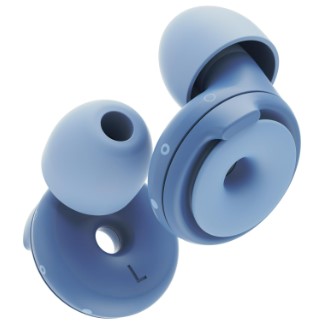 Loop earplugs have gained popularity for their stylish design, comfort, and effective noise reduction. They offer several models tailored to different needs, ensuring a solution for every situation.
Loop earplugs have gained popularity for their stylish design, comfort, and effective noise reduction. They offer several models tailored to different needs, ensuring a solution for every situation.
Key Features:
- Loop Engage 2: SNR of 16 dB (NRR 10 dB), ideal for everyday use where you need to reduce ambient noise without completely blocking it out.
- Loop Engage 2 Kids: Designed for children aged 6 and up, similar to Engage 2 but tailored to fit smaller ears, promoting healthy hearing habits early on.
- Loop Experience 2: SNR of 18 dB (NRR 12 dB), perfect for music lovers who want to enjoy live performances with reduced but clear audio.
- Loop Experience 2 Plus & Engage 2 Plus: These models offer the same benefits as Experience 2 and Engage 2 but include a Mute accessory that boosts sound protection by an additional 5 dB.
- Loop Quiet 2: SNR of 27 dB (NRR 20 dB), designed for maximum noise reduction, suitable for sleeping, studying, or extremely loud environments. The Quiet 2 Plus model offers double tips for maximum reduction.
- Loop Switch: Designed for versatility, Switch allows you to toggle between two levels of protection, offering either 18 dB (NRR 12 dB) or 27 dB (NRR 20 dB) of noise reduction, depending on your environment and needs.
Pros:
- Stylish Design: Available in various colors, making them fashionable as well as functional.
- Comfortable Fit: Multiple silicone ear tip sizes ensure a good fit for everyone.
- Easy Maintenance: Simple to clean and maintain.
Cons:
- Limited Noise Reduction in Some Models: The SNR of 16-18 dB may not be sufficient for very loud environments.
- Price: Some models, particularly the Plus versions, can be relatively expensive compared to similar products.
- Additional Accessories: The need for extra accessories (like the “Mute” add-on) to achieve higher noise reduction might not appeal to all users.
Loop earplugs retail between $20 to $45.
Loop earplugs cater to a variety of needs, from everyday use to concert settings, with models like the Loop Experience 2 and Loop Quiet 2. The Experience series is perfect for music lovers who want high-fidelity sound with reduced volume, while the Quiet model is ideal for maximum noise reduction.
The added “Mute” insert accessory allows for further customization of noise protection, making Loop earplugs a versatile option for many situations.
Custom Filtered Earplugs: A Premium Option
For frequent concertgoers or those working in loud environments, custom filtered earplugs offer superior comfort and protection. These earplugs are custom-molded to fit your unique ear shape and come with high-fidelity filters designed to maintain sound quality while reducing noise.
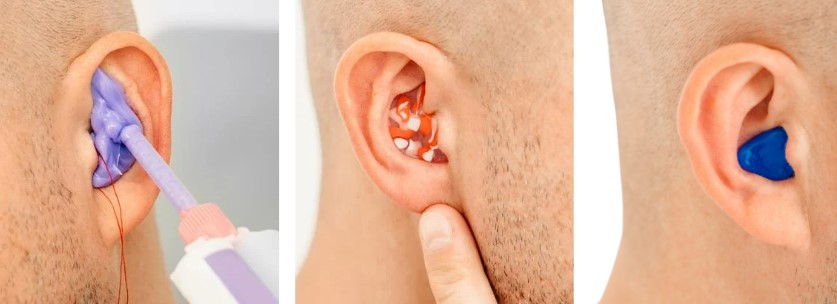
Custom fit earplugs offer the highest level of personalization. Shown on left, ear impression being taken by an audiologist, which is then sent to a lab and custom made to order based on the individual’s needs
Leading Brands
- Westone: Westone offers custom earplugs with various noise reduction levels, known for their comfort and durability. They provide tailored solutions for different needs, making them a popular choice among users.
- Sensaphonics: Sensaphonics focuses on preserving hearing health, making their custom earplugs highly regarded among musicians and concertgoers. They offer precise noise reduction without compromising sound clarity.
- Ultimate Ears: Known for their custom fit and various filter options, Ultimate Ears earplugs are a top choice for professionals needing high-level hearing protection.
Advantages of Custom Earplugs
- Fit and Comfort: Custom earplugs are molded to fit your ears precisely, offering superior comfort compared to off-the-shelf options. They don’t exert pressure on your ear canal, making them more comfortable for extended wear.
- Ease of Use: With a custom fit, earplugs are easy to insert correctly every time. They are designed to fit in one way, ensuring consistent protection and ease of use.
- Sound Quality: Custom earplugs, especially those with acoustic filters, offer high-quality sound. They preserve sound clarity while reducing noise evenly, making them ideal for musicians and those in noisy environments.
- Customization of Sound Protection: Many custom earplugs come with interchangeable filters, allowing you to adjust the level of noise reduction based on your needs. Options typically range from -9 dB for light protection to -33 dB for maximum protection.
Filter Options
- -33 dB Filters: Maximum protection, ideal for music festivals or extremely loud environments.
- -25 dB Filters: High-level protection for frequent exposure to loud noise.
- -15 dB Filters: Medium protection, suitable for occasional use.
- -9 dB Filters: Light protection for environments with intermittent loud sounds.
Cons
- Cost: Custom earplugs can be significantly more expensive than disposable options. While high-quality foam earplugs may cost about $0.20 per pair, custom earplugs typically start around $150. However, they are designed to last for many years, offering better long-term value despite the higher initial cost.
Conclusion
Whether you’re a casual concertgoer or a die-hard music fan, protecting your hearing is essential. While regular earplugs can provide basic protection, filtered earplugs offer a superior listening experience by reducing harmful noise levels without compromising sound quality. Brands like Loop, Earpeace, Eargasm, and Sennheiser provide excellent options for anyone looking to enjoy live music safely.
For those seeking the ultimate in comfort and sound fidelity, custom filtered earplugs from brands like Westone, Sensaphonics, and Ultimate Ears are worth the investment. Make sure you choose the right earplugs for your needs and keep enjoying the music you love without risking your hearing health.
Resources:
**For those interested to take a deep dive and listen to different sound samples of popular plugs, check out this video:
References
- Beach, E. F., Nielsen, L., & Gilliver, M. (2016). Providing earplugs to young adults at risk encourages protective behaviour in music venues. Global Health Promotion, 23(2), 45-56.
- Bockstael, A., Keppler, H., & Botteldooren, D. (2015). Musician earplugs: Appreciation and protection. Noise & Health, 17(77), 198-208.
- Ergun, O., Cakmak, E., & Alniacik, A. (2024). Recreational music exposure and hearing health in young adults. European Archives of Oto-Rhino-Laryngology, 281, 4373–4378. https://doi.org/10.1007/s00405-024-08666-1
- Kraaijenga, V. J., Ramakers, G. G., & Grolman, W. (2016). The effect of earplugs in preventing hearing loss from recreational noise exposure: A systematic review. JAMA Otolaryngology–Head & Neck Surgery, 142(4), 389-394.
- Ramakers, G. G., Kraaijenga, V. J., Cattani, G., van Zanten, G. A., & Grolman, W. (2016). Effectiveness of earplugs in preventing recreational noise–induced hearing loss: A randomised clinical trial. JAMA Otolaryngology–Head & Neck Surgery, 142(6), 551-558.
About the Author
 Nausheen Dawood is an experienced Audiologist and Project Manager with a professional background including primary health care, corporate social investment, and business development. Proficient in the development of academic courses, training, and lecturing, with a focus on clinical student training and supervision. Adept in freelance copywriting, particularly in audiology and health-related topics. Holds a Masters degree in Audiology (Cum Laude), with a strong foundation in clinical research, project development, and strategic planning, complemented by technical training. Specializes in content development and training tailored to diverse audiences. Demonstrates a long-term commitment to research and development, including the implementation of randomized controlled trials, projects, and clinical examinations. Known for establishing robust networks and cultivating valuable stakeholder relationships.
Nausheen Dawood is an experienced Audiologist and Project Manager with a professional background including primary health care, corporate social investment, and business development. Proficient in the development of academic courses, training, and lecturing, with a focus on clinical student training and supervision. Adept in freelance copywriting, particularly in audiology and health-related topics. Holds a Masters degree in Audiology (Cum Laude), with a strong foundation in clinical research, project development, and strategic planning, complemented by technical training. Specializes in content development and training tailored to diverse audiences. Demonstrates a long-term commitment to research and development, including the implementation of randomized controlled trials, projects, and clinical examinations. Known for establishing robust networks and cultivating valuable stakeholder relationships.



